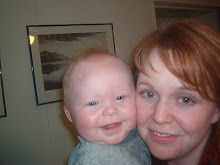I've been thinking a lot about background knowledge and schema this week. I love these concepts and I really try to use a lot of background knowledge in my lessons. The thing I've really been thinking about this week is the fact that there is such a discrepency in background knowledge among some of my students. I have many students who are well-read upon entering my class and they are ready for so much literature and so many challenging pieces. I have other students who don't read at all and reading for enjoyment is so foreign to them. Sometimes it seems hard to bridge the gap because there is such a difference in background knowledge and schema. I imagine that teachers in science, history, math, art, music and all other subjects run into this problem in their content area.
I think that the best way to effectuate learning when background knowledge is so different is to include a huge base of background information. In our classroom study of Shakespeare, we do a lot of background set up before we start to read Romeo and Juliet. We do basic research activities that discuss who Shakespeare was and why he was important in history. We study cultures and traditions of the time. I know that some of my students know about some of these things, I just hope that the knowledge base is broad enough that all students are learning something and have a schema for when we start to read.
Subscribe to:
Post Comments (Atom)

I think dealing with huge diversity in students' knowledge is one of our hardest tasks. I think you are taking the right approach by having all of the students do research and prepare for a reading piece. Those who already have a rich background will get even more and those who were unprepared will come to the story better prepared.
ReplyDeleteI really agree that the best way to effect teaching is to front-load students with all the prerequisite information they need for success with the concept or topic being taught. I thought the most difficult part of my job was bridging the "cultural divide." Every student's schema was so varied and different. I think your thoughts are spot on when it comes to giving them huge amounts of background information prior to starting the unit. I think the students with a deeper schema benefit from the exercise and are able to make more concrete connections too. Great thoughts thanks for sharing.
ReplyDeleteIn a religious education setting, I first though that most of my students had backgrounds like me; parents married, stayed married, everyone lived happily ever after. So so anymore. Students schemata vary just as much as their looks do. We can't assume much anymore. However, I have found that because of the wide varieties of background knowledge and experience the classroom discussions are richer and in a lot of cases more profound (and real). Thanks for giving me some food for thought.
ReplyDeleteHey Amy,
ReplyDeleteGreat ideas about cultural and historical perspectives when teaching literature.
I can't imagine how challenging it might be teaching and discussing Shakespeare, even though I was an English major.
Helping the learner understand historical and cultural perspectives probably helps them interpret the text much more effectively, but then I think what if our own interpretation of historical data changes or is skewed, because that's an interpretation? That probably changes the text because the ideas that frame the interpretation change.
Same thing with cultural perspectives. Depending on the student and the educator, a cultural perspective shifts the text. Do women read Shakespeare differently than men? Do black women read him differently than white women?
It's all fascinating.
I totally agree with what you just wrote about schema. I've been thinking a lot about it to. I'm teaching Film literature and we just looked at the film Luther. It's one of my favorite movies about history and the great influence Martin Luther had on Literacy and the Reformation. My 7th grade honor students in there come in very well read, even more so than the 9th graders. It's kind of baffling how to try and meet all of their needs through differentiation of teaching. It's really something to think about about because my 7th students appreciated what Luther did for Literacy
ReplyDeletemore than some of the 9th graders. Huh.... Let me know if you have any ideas about how to bridge the gap. Derek
so I was wondering what the students who have that background know;edge like when you teach the whole class lessons on background knowledge? Do they get bored or engage in off-task behavior at all?
ReplyDeleteThanks for all of the questions that are brought up through responses.
ReplyDeleteFirst of all Mike, I think that everyone brings a different perspective to every activity that we do. I don't know how to get everyone on the same page and I think that in most instances, it's just enough to acknowledge that everyone has different backgrounds and schema. I think that as long as we are explicit that everyone has different views, we will have a lot more success.
Derek--I have no idea how to fill the gap between students who have lots of schema and students who don't. That's the most frustrating part of my job. I would like to find the answer, write a book and sell thousands of copies.
Brian--About boredom and background knowledge. I don't know about other content areas, but in Language Arts it is really easy to give students background information and they don't even know it. We do mapping activities, simulations, fun research projects. I rarely have students get very bored when we do background information lessons.